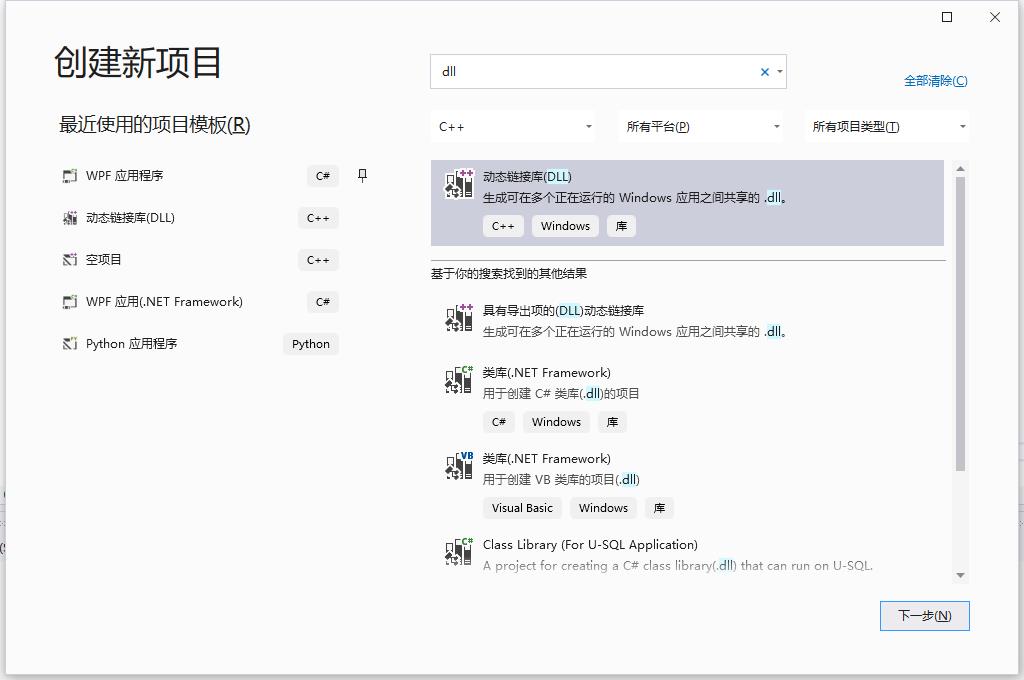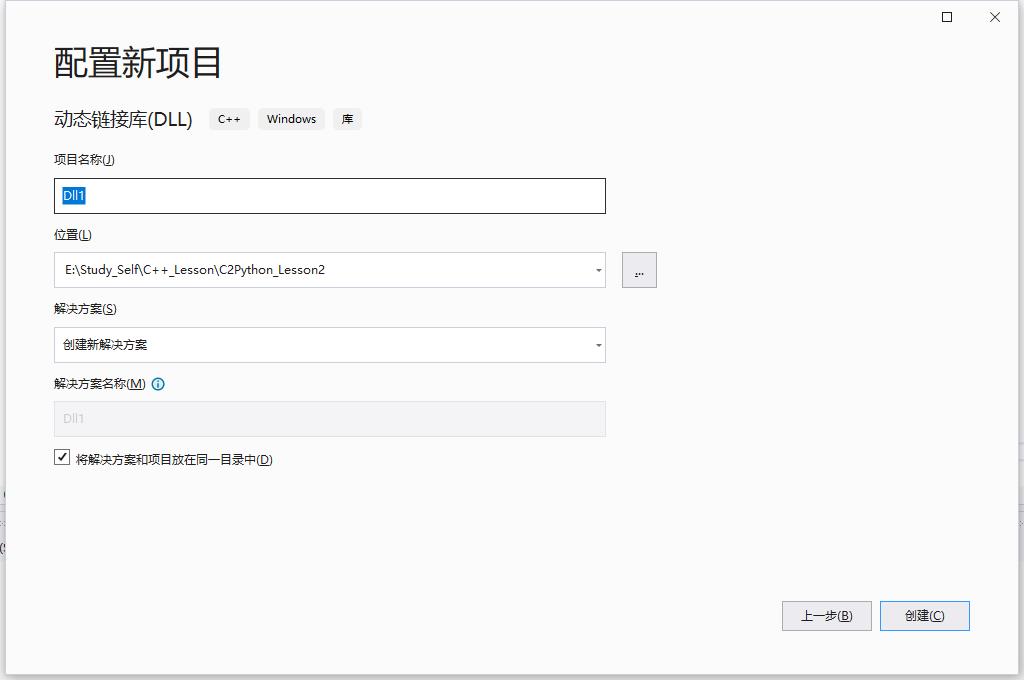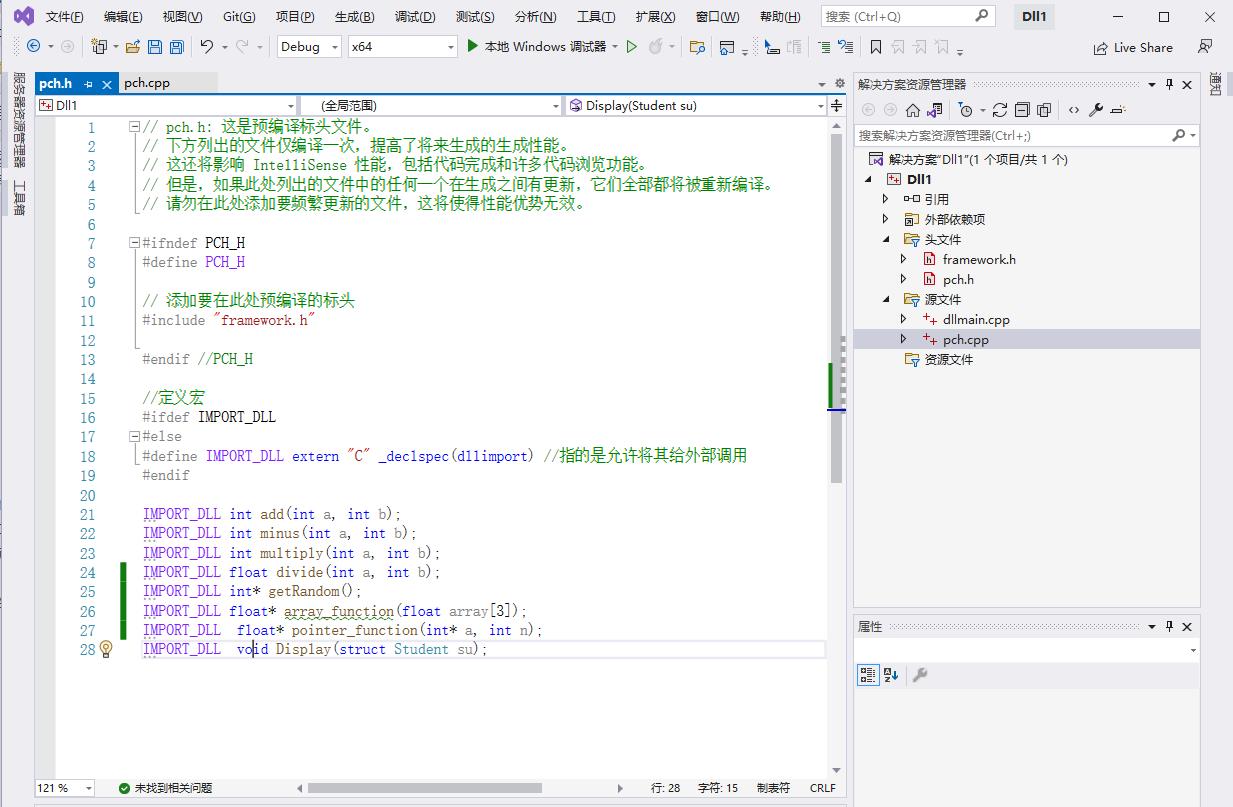Python调用C++语言(DLL)
Posted 王张飞
tags:
篇首语:本文由小常识网(cha138.com)小编为大家整理,主要介绍了Python调用C++语言(DLL)相关的知识,希望对你有一定的参考价值。
前言:本文可结合Python调用C语言(DLL)使用,效果更佳。
采用导出形式:_declspec(dllimport)
功能:
int add(int a, int b);-------------------------------return a + b;
int minus(int a, int b);-----------------------------return a - b;
int multiply(int a, int b);--------------------------return a * b;
float divide(int a, int b);--------------------------return a / b;
int* getRandom();------------------------------------return r; 返回静态数组首地址
float* array_function(float array[3]);---------------return q; 返回静态数组首地址 / 返回指针首地址
float* pointer_function(int* a, int n);--------------return q; 返回指针首地址
void Display(struct Student su);-----------------------------; 结构体
创建DLL项目
运行Python将参数进行传递给DLL,然后从DLL返回指针(包含多个变量)
打开VisualStudio 创建DLL

点击下一步
命名为Dll1即可

点击创建即可
然后定义宏:
在头文件中定义即可,宏的作用的是允许该函数能够被外部访问,并直接调用。
如下:

C++代码:
// pch.h: 这是预编译标头文件。
// 下方列出的文件仅编译一次,提高了将来生成的生成性能。
// 这还将影响 IntelliSense 性能,包括代码完成和许多代码浏览功能。
// 但是,如果此处列出的文件中的任何一个在生成之间有更新,它们全部都将被重新编译。
// 请勿在此处添加要频繁更新的文件,这将使得性能优势无效。
#ifndef PCH_H
#define PCH_H
// 添加要在此处预编译的标头
#include "framework.h"
#endif //PCH_H
//定义宏
#ifdef IMPORT_DLL
#else
#define IMPORT_DLL extern "C" _declspec(dllimport) //指的是允许将其给外部调用
#endif
IMPORT_DLL int add(int a, int b);
IMPORT_DLL int minus(int a, int b);
IMPORT_DLL int multiply(int a, int b);
IMPORT_DLL float divide(int a, int b);
IMPORT_DLL int* getRandom();
IMPORT_DLL float* array_function(float array[3]);
IMPORT_DLL float* pointer_function(int* a, int n);
IMPORT_DLL void Display(struct Student su);
然后在cpp文件 实现这些即可
// pch.cpp: 与预编译标头对应的源文件
#include <iostream>
#include <cstdlib>
#include <ctime>
#include "pch.h"
// 当使用预编译的头时,需要使用此源文件,编译才能成功。
using namespace std;
int add(int a, int b)
return a + b;
int minus(int a, int b)
return a - b;
int multiply(int a, int b)
return a * b;
float divide(int a, int b)
float m = (float)a / b;
//cout << m << endl;
return m;
int* getRandom()
static int r[10];
// 设置种子
srand((unsigned)time(NULL));
for (int i = 0; i < 10; ++i)
r[i] = rand();
/*cout << r[i] << endl;*/
return r;
float* array_function(float array[4])
/*
// 直接return数组的话只能看到第一个元素,方案1:定义数组为静态,进行返回所有元素
static float dd[4];
for (int i = 0; i < 4; i++)
dd[i] = array[i];
return dd;
*/
// 直接return数组的话只能看到第一个元素,方案2:借助指针进行返回所有元素
float dd[4];
float* p, * q;
p = q = (float*)malloc(sizeof(float) * 4);
for (int i = 0; i < 4; i++)
dd[i] = array[i];
for (int i = 0; i < 4; i++)
*p++ = dd[i];
return q;
float* pointer_function(int* a, int n)
float* p, * q;
q = p = (float*)malloc(sizeof(float) * 4);
int i;
for (i = 0; i < 4; i++)
*p++ = i;
return q;
struct Student
char name[30];
float fScore[3];
;
void Display(struct Student su)
printf("-----Information------\\n");
printf("Name:%s\\n", su.name);
printf("Chinese:%.2f\\n", su.fScore[0]);
printf("Math:%.2f\\n", su.fScore[1]);
printf("English:%.2f\\n", su.fScore[2]);
printf("总分数为:%f\\n", su.fScore[0] + su.fScore[1] + su.fScore[2]);
printf("平均分数为:%.2f\\n", ((su.fScore[0] + su.fScore[1] + su.fScore[2])) / 3);
接下来是点击生成,会在debug目录下生成dll文件(这就是我们所需要的)
Python代码:
使用Python脚本调用D生成的DLL,用于测试是否成功调用DLL
创建Python脚本, Python2C.py
#!/bin/python3
from ctypes import *
import os
def add_C():
ll = cdll.LoadLibrary
lib = ll("Dll1.dll")
lib.add.argtypes = [c_int, c_int] #设置输入参数类型为[c_int, c_int] 因为有两个输入值
lib.add.restype = c_int #设置返回值类型为 c_int
c = lib.add(3,2)
print("python outpout add:", c)
def minus_C():
ll = cdll.LoadLibrary
lib = ll("Dll1.dll")
lib.add.argtypes = [c_int, c_int] #设置输入参数类型为[c_int, c_int] 因为有两个输入值
lib.minus.restype = c_int #设置返回值类型为 c_int
c = lib.minus(3,2)
print("python outpout minus:", c)
def multiply_C():
ll = cdll.LoadLibrary
lib = ll("Dll1.dll")
lib.add.argtypes = [c_int, c_int] #设置输入参数类型为[c_int, c_int] 因为有两个输入值
lib.add.restype = c_int #设置返回值类型为 c_int
c = lib.multiply(3,2)
print("python outpout multiply:", c)
def divide_C():
ll = cdll.LoadLibrary
lib = ll("Dll1.dll")
lib.add.argtypes = [c_int, c_int] #设置输入参数类型为[c_int, c_int] 因为有两个输入值
lib.divide.restype = c_float #设置返回值类型为 float
c = lib.divide(3,2)
print("python outpout divide:", c)
def x_getRandom():
ll = cdll.LoadLibrary
lib = ll("Dll1.dll")
lib.getRandom.restype = POINTER(c_int) #设置返回值类型为 int*
a = lib.getRandom()
for i in range(0,10):
print("python outpout getRandom:", a[i])
def x_array_function():
ll = cdll.LoadLibrary
lib = ll("Dll1.dll")
lib.array_function.restype = POINTER(c_float) #设置返回值类型为 c_float*
arr = [1,2,3,4]
a = (c_float*len(arr))(*arr)
a_p = POINTER(c_float)(a)
test_address_value = lib.array_function(a_p,4)
# return数组,只能输出第一个元素,输出多个元素可将数组赋值给指针,然后返回指针首地址
for i in range(3):
print("python outpout array_function:", test_address_value[i])
def x_pointer_function():
ll = cdll.LoadLibrary
lib = ll("Dll1.dll")
lib.pointer_function.restype = POINTER(c_float) #设置返回值类型为 c_float*
arr = [1,2,3,4]
a = (c_float*len(arr))(*arr)
a_p = POINTER(c_float)(a)
test_address_value = lib.pointer_function(a_p,4)
# return数组,只能输出第一个元素,输出多个元素可将数组赋值给指针,然后返回指针首地址,参考下面函数
for i in range(3):
print("python outpout pointer_function:", test_address_value[i])
def Display_C():
class Student(Structure):
_fields_ = [("name",c_char * 30),
("fScore", c_float * 3)
]
su = Student()
su.name = b"test-sdk"
PARAM = c_float * 3
fScore = PARAM()
fScore[0] = 55.1
fScore[1] = 33.2
fScore[2] = 51.3
su.fScore = fScore
ll = cdll.LoadLibrary
lib = ll("Dll1.dll")
# lib.Display.restype = c_float
lib.Display.argtypes = [Student] #这一行很重要
lib.Display(su)
print('----- finish -----\\n')
if __name__ == '__main__':
add_C()
minus_C()
multiply_C()
divide_C()
x_getRandom()
x_array_function()
x_pointer_function()
Display_C()
生成结果
运行python Python2C.py,:
PS E:\\Study_Self\\C++_Lesson\\C2Python_Lesson2\\Dll1\\x64\\Debug> python .\\Python2C.py
python outpout add: 5
python outpout minus: 1
python outpout multiply: 6
python outpout divide: 1.5
python outpout getRandom: 24490
python outpout getRandom: 15919
python outpout getRandom: 21190
python outpout getRandom: 6009
python outpout getRandom: 18730
python outpout getRandom: 24367
python outpout getRandom: 23687
python outpout getRandom: 9274
python outpout getRandom: 21534
python outpout getRandom: 7405
python outpout array_function: 1.0
python outpout array_function: 2.0
python outpout array_function: 3.0
python outpout pointer_function: 0.0
python outpout pointer_function: 1.0
python outpout pointer_function: 2.0
-----Information------
Name:test-sdk
Chinese:55.10
Math:33.20
English:51.30
总分数为:139.600006
平均分数为:46.53
----- finish -----
完整代码地址:https://download.csdn.net/download/RNG_uzi_/55574679
参考资料:
Python调用C语言(DLL)
Python调用C++语言(DLL)
Ubuntu下Python与C/C++混合编程(简单调用)
哔哩哔哩视频:Python和C混合编程
关于python调用C++所形成的dll文件中的以指针为返回值的函数
Python–ctypes(数据类型详细踩坑指南)
以上是关于Python调用C++语言(DLL)的主要内容,如果未能解决你的问题,请参考以下文章
如果没有可用的 c++ 编译器,C 语言可以调用用 c++ 编写的 DLL 吗?